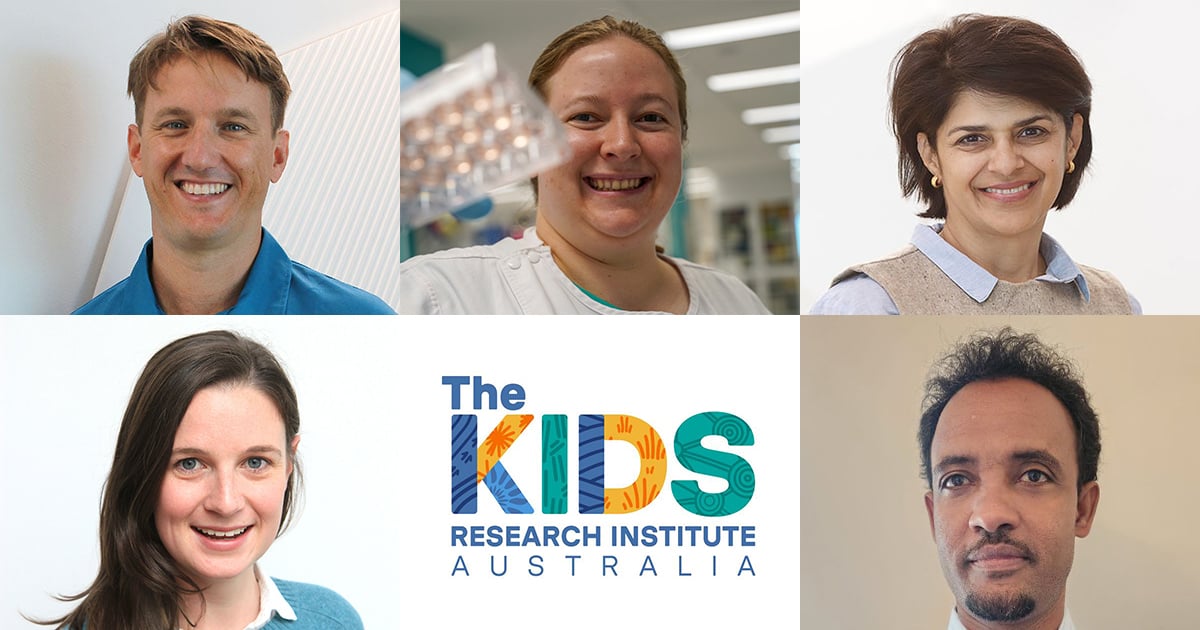
Five researchers from The Kids Research Institute Australia have secured vital funding support through the WA Near Miss Awards, allowing them to continue innovative health projects that narrowly missed out on national funding.
Funded by the WA Government’s Future Health Research and Innovation (FHRI) Fund, the Awards provide critical second-chance grants to early- and mid-career researchers.
Dr Luke Garratt, Dr Katherine Landwehr, Dr Minda Sarna, Dr Annabel Short and Dr Belaynew Taye will utilise their grants to progress research related to immune cells, air pollutants, healthcare costs owing to respiratory viruses, brain cancer, and liver cancer.
Dr Luke Garratt – an Associate Investigator within the Wal-yan Respiratory Research Centre and an Adjunct Research Fellow at The University of Western Australia’s (UWA) Medical School and Centre for Child Health Research (CCHR) – and his team will investigate how neutrophils, immune cells that are key to good health, decide their responses and apply different core functions. His previous research has identified that neutrophil gene expression is different between males and females and that migration induces a very large set of changes in gene expression, which calls into question current neutrophil research approaches.
With this new round of funding, Dr Garratt’s team will build a comprehensive neutrophil biology program to better understand the consequences of sex-related differences in neutrophils for people with chronic inflammatory diseases. The team will also measure how differently migrated and unmigrated neutrophils behave in common tests of neutrophil function.
Dr Katherine Landwehr – a Senior Research Officer within the Wal-yan Respiratory Research Centre’s Respiratory Environmental Health team and UWA’s CCHR – will utilise her grant to assess the physical and chemical profile and resulting exposure health effects for different types of inhaled pollutants, such as renewable fuel exhaust, bushfire smoke, cigarette smoke and vapes.
Her team will use this data to link resulting health effects with the physical and chemical makeup of different air pollutants to create a mathematical model. This model will allow Dr Landwehr’s team to quickly predict potential health effects by measuring only a pollutant’s physical and chemical profile.
Dr Minda Sarna – a Senior Research Officer within the Wesfarmers Centre of Vaccines and Infectious Diseases’ Infectious Diseases Epidemiology team and a Post-doctoral Research Fellow at Curtin University – will utilise her grant to calculate the healthcare costs associated with common respiratory viruses, including respiratory syncytial virus (RSV), and identify the most cost-effective prevention strategies. She will then determine the most efficient use of healthcare resources and the most cost-effective prevention strategies
The research will help doctors, families, and health decision-makers better understand who is at higher risk, how much these illnesses cost the health system, and how to prevent them in the most effective and affordable way.
Dr Annabel Short’s project aims to develop safer, more effective therapies by studying how brain tumours grow and interact with the immune system, using advanced models that closely mimic childhood brain cancer.
By tracking both tumour response and healthy brain development, Dr Short – a member of WA Kids Cancer Centre’s Brain Tumour Research team and an Adjunct Senior Lecturer at UWA’s Medical School and CCHR – hopes to pave the way for future clinical trials that prioritise not just survival, but long-term wellbeing, giving children the best chance to thrive.
Dr Belaynew Taye – a Senior Research Officer within the Wesfarmers Centre of Vaccines and Infectious Diseases’ Infectious Diseases Epidemiology team and an Adjunct Research Fellow at UWA – is working to improve early detection and treatment of liver cancer, address health inequities in Culturally and Linguistically Diverse (CALD) communities, and inform national screening policies to support Australia’s goal of eliminating viral hepatitis as a public health threat.
Viral hepatitis is a leading cause of hepatocellular carcinoma (HCC), yet testing and screening rates remain low, especially among CALD populations who face disproportionately high rates of the disease. The reasons for this disparity remain unclear, limiting the development of effective interventions.
Dr Taye’s research will investigate testing and screening practices, apply machine learning to identify people at highest risk, and evaluate the cost-effectiveness of targeted HCC screening. Using large, linked health datasets – including hospital records, cancer registries, and mortality data – his team will model disease patterns, predict risk, and assess the value of early detection strategies.
All five grants will be administered by The University of Western Australia.
